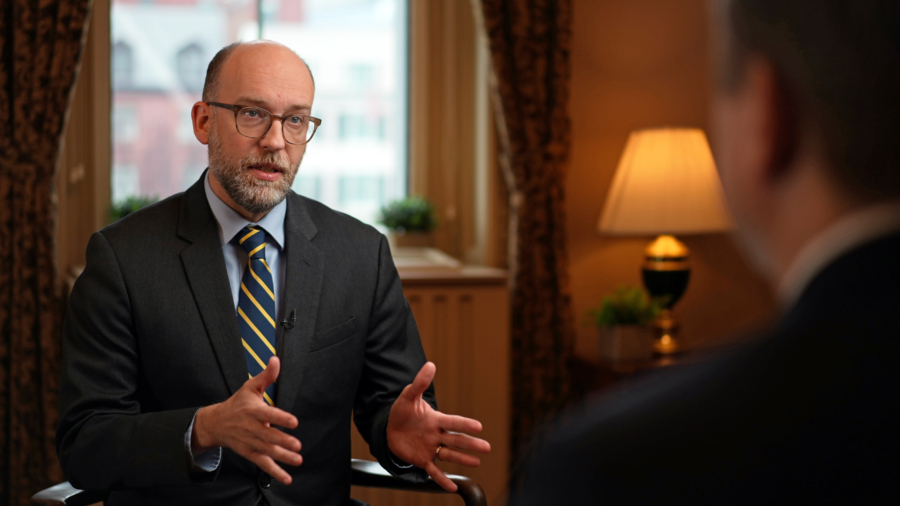Russ Vought is on track to return to a little-known but powerful position in the incoming administration at the Office of Management and Budget (OMB) after President-elect Donald Trump nominated him on Nov. 22.
The OMB’s director is crucial to ensuring that each executive agency is coordinated behind the president’s economic and political goals, playing a role in finances and regulations enacted by executive agencies.
Vought is soon to reprise the role, in which he served during Trump’s first administration after Mick Mulvaney, his predecessor, was named Trump’s chief of staff.
In his announcement of the endorsement in a post on Truth Social, Trump wrote that Vought “is an aggressive cost cutter and deregulator who will help us implement our America First Agenda across all Agencies.”
Trump said that Vought would “dismantle the Deep State and end weaponized government.”
Vought, who wrote a chapter of Project 2025—the Heritage Foundation’s vision for successful conservative administrations—has been clear about his hopes for the incoming administration, including reducing bureaucracy and returning substantial powers to the state.
While implementing his ideas could represent a political earthquake for Washington, they align broadly with decades of conservative proposals and complaints: cutting spending and regulations, reducing the power of the bureaucracy, and returning power to states and local communities.
Here’s what to know about the nominee’s plans.
Spending and Regulation Cuts
During his first tenure at the OMB, Vought emphasized cuts to spending and regulations.
Vought said that while he understands the necessity of many regulations—particularly mentioning those related to food safety—he’s expressed skepticism toward how expansive these regulations have become.
“We’re doing everything we can to get the government out of the American people’s life,” Vought said during a July 2019 appearance on EpochTV’s “American Thought Leaders.”
Vought will soon again be responsible for drafting the president’s budget proposals to Congress, as well as ensuring that these align with Trump’s policy priorities.
Likewise, he’ll have the power to veto certain regulations proposed by agencies like the Environmental Protection Agency, Department of Transportation, Department of Labor, and others through the Office of Information and Regulatory Affairs (OIRA). The OIRA is a subdivision of the OMB.
In his endorsement of Vought, Trump mentioned Vought’s leading role in cutting more regulations than were added during Trump’s first four years in office.
Rooting Out Anti-POTUS Bureaucrats
In his entry for Project 2025, Vought made clear that he sees it as a priority to strengthen the influence of the president while weakening the influence of the unelected bureaucrats who serve in the executive branch.
These bureaucrats, Vought contends, are contrary to the intention of the Founders and the Constitution, which says that executive power “shall be vested in a President of the United States.”
But today, Vought wrote, the president “assumes office to find a sprawling federal bureaucracy that all too often is carrying out its own policy plans and preferences.” He then said the worst case of this is when the bureaucracy aligns with a radical or progressive faction in the country.
The power of bureaucrats has long been a complaint—and a target—for Republicans.
During his first term, Trump made an effort to counter the bureaucracy’s power with Executive Order 13957, which created exceptions in federal employment standards to allow employees with jobs of a “policy-determining, policy-making, or policy-advocating character” to be fired more easily.
However, the executive order came just weeks before the 2020 election, and was quickly rescinded by President Joe Biden when he took office.
Vought has been a strong advocate of the proposal, and Trump could quickly reimplement it alongside other rescinded executive orders soon into his second term.
Using Federal Power to Weaken Federal Power
In the long run, Vought says he plans to use the substantial powers of the OMB and related agencies aggressively to increase the power of the president himself while weakening federal power more broadly.
While Vought encouraged returning power to the president as an individual, he also proposed that the goal should be an ultimately weaker executive branch.
“The great challenge confronting a conservative President is the existential need for aggressive use of the vast powers of the executive branch to return power—including power currently held by the executive branch—to the American people,” Vought wrote.
Vought emphasizes a federalist approach to policy, where state and local governments will take precedence over the federal government.
“Success … will require a rare combination of boldness and self-denial: boldness to bend or break the bureaucracy to the presidential will and self-denial to use the bureaucratic machine to send power away from Washington and back to America’s families, faith communities, local governments, and states,” Vought said.
From The Epoch Times

